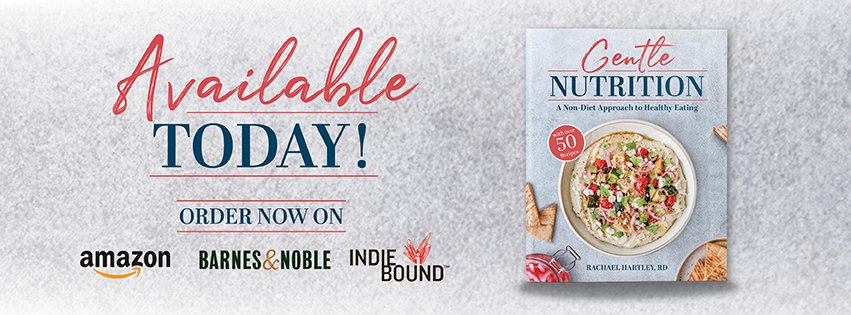Intuitive Eating During Pregnancy: How It Helped Me Have a Healthier, Less Stressful Pregnancy
One of the benefits of intuitive eating is that it can help you navigate many different seasons of life. This blog post explores intuitive eating during pregnancy, and how it can help you cope with some of the very common “joys” of pregnancy, including reflux, morning sickness, and iron deficiency.
Today’s blog post is brought to you by my lovely associate dietitian, Kate Bennett. She sees clients virtually throughout the US and out of our Columbia, SC office. Learn more about here.
One of the many benefits of intuitive eating is being able to use those skills in different seasons of life. Since intuitive eating does not come with a list of rigid rules, you can adapt the principles for different life changes. As new challenges arise, health changes, or preferences shift, eating style may also adjust. For me, one of those recent big life changes was my pregnancy last year. In this blog post, I am going to share how intuitive eating during pregnancy helped me feed a changing body. .
Like most people, I did not come into my adult years as an intuitive eater. Trust in my body and my innate ability to feed myself had been degraded by the diet culture. With lots of practice and re-learning, over the years I relearned how to eat intuitively. Now I have confidence in nourishing my body without the need for a lot of outside input. [Of course, I am a dietitian so I recognize I have a headstart on understanding these concepts.] Finding myself pregnant (and a bit freaked!) I was glad that nutrition and eating was not an additional stressor on my mind.
Mainstream Nutrition Advice During Pregnancy
At my first OBGYN appointment I was given a little booklet that gave me all the ins and outs of pregnancy. A few pages were dedicated to nutrition. There were instructions to increase calories by “x” amount, drink “x” amount of fluid, and to take a prenatal vitamin, along with a list of several foods not to eat due to the risk of food poisoning (probably helpful to follow this list — but even this list is ever changing). There was also advice about not eating “too much” and avoiding extra weight gain. Not unlike general nutrition advice, reading these guidelines can feel incredibly impersonal, like they were written for a robot and not a living person. Nothing in the book suggested individuals may have different food and nutrition needs. Admittedly, this information was not new to me as a dietitian, but even still I opted to not focus much on the specifics other than starting a prenatal and avoiding high risk foods for food poisoning. I decided to take the rest of the information in a very general way. Except for the information about watching your weight - I rolled my eyes at that! Intuitive eating has taught me that my body will grow the way that it needs to.
The most important nutrition advice for pregnancy is to eat enough nutrients and calories to support oneself and the growing human inside. There may be a need to intentionally look for foods high in certain nutrients if a deficiency exists, but for the most part, increasing intake of food in general can help to cover those nutritional gaps.
Most of the time during my pregnancy, I relied on increased hunger signals - my body simply asking for more food. I didn’t question those signals, just listened and fed myself more. Intuitive Eating during pregnancy reminded me that I was the expert of my body and that I could use external nutrition advice as a supplement to my own internal wisdom.
While I am grateful I did not have a particularly hard pregnancy, I did face many of the usual challenges that come with growing a baby. Here’s how intuitive eating during pregnancy helped me navigate those challenges:
Morning Sickness and Poor Appetite
The dreaded morning sickness hit me abruptly and it was rough! The mere thought of eating was a turn off at times. Even coffee started to taste bad (sad!). I knew I could not rely on my body to remind me to eat during this time - so I used a basic structure of eating about every 3 hours. I tried my best to find a few foods that I could reliably depend on to tolerate and ate them more frequently. For me, those foods were chocolate milk (preferably the Aldi brand), cinnamon raisin bagels with peanut butter, pretzels, veggie subs (with lots of vinegar!) and canned fruit. I was taking the prenatal vitamin so I knew that would also help fill some gaps. The gummy version came in clutch and was way better than trying to swallow a pill during those rough months of morning sickness.
If you struggle with morning sickness, there are things you can do to manage it. Eating more frequently can be helpful, as avoiding an empty stomach actually helps to keep the nausea at bay. Another way is to start with something bland, like cheerios, then eat a meal. In some cases, the smell of food might exacerbate nausea, so eating more cold or room temperature foods may be the way to go.
If eating becomes really difficult, use some of your “brain knowledge” to know what your body needs. For some, morning sickness is very severe and can require medical intervention. I opted for an over the counter medication safe for pregnancy, which helped me eat.
Intuitive eating during pregnancy helped me to know when my body cues were reliable, and when I should focus on just eating enough.
Acid Reflux
Gastrointestinal symptoms are extremely common in pregnancy. Having a growing baby pressing on all your organs doesn’t lend itself to comfortable digestion! Constipation, diarrhea, nausea, acid reflux, frequent belching, vomiting are all some of the *joys* that can come with pregnancy. Utilizing some gentle nutrition can be helpful in managing some of these symptoms. For example, adding prunes to your breakfast may help keep you regular.
One of the biggest issues I had during my pregnancy was absolutely terrible reflux. I’m talking about “waking up in the middle of the night choking” terrible. This really made eating difficult for me because eating physically hurt. I did not want to eliminate anything from my diet since I was already having so many aversions, not to mention there was no guarantee that would help. I opted for a PPI that worked magically for me. This was a personal choice but I did not want to risk not getting adequate nutrition. Other non-food related interventions that helped were sleeping at an incline and avoiding tight wearing clothes (hello, maternity leggings!)
Intuitive eating during pregnancy helped me know that gentle nutrition is one option of many for managing GI symptoms. Nutrition is not the end all, be all, and sometimes medication can be a helpful option versus eliminating foods.
Iron Deficiency
Low iron is very common during pregnancy. I was diagnosed with iron deficiency halfway through and was prescribed an iron supplement, however it made me very ill. After consulting with my doctor, I decided to focus on adding in more iron rich foods. The two most appealing foods were bran flakes (fortified with iron) which I ate with orange juice on the side, as the vitamin C helps to absorb the iron, and red meat in the form of burgers and tacos. Unlike the reflux, I used gentle nutrition to treat my low iron levels. Thankfully my levels were just mildly low so I was able to bring them up by intentionally eating foods high in iron. It’s important to talk to your doctor here - sometimes iron supplements are necessary due to dangerously low levels of iron.
Intuitive eating during pregnancy helped me use gentle nutrition to add foods to address my nutrition-related concerns.
Cravings
A common stereotype during pregnancy is the image of a pregnant woman eating pickles and ice cream in the same bite. Hormones absolutely can change the way food tastes and what’s appealing. However, the narrative that women are allowed to be totally uninhibited eaters while pregnant says a lot about what’s expected when not pregnant. I really sympathize with the mindset during pregnancy that says “better eat what I can while I can” because it probably feels so good to feel free from judgment. It’s one of the few (only?) times women are encouraged to eat more! I had many people make comments about how I was allowed to want something or servings were justified as a pregnant woman.
While I did find myself craving something, like a Powerade Slushee from Sonic or a giant lemonade, I didn’t really ever feel my cravings felt different from the cravings I experience in non-pregnant life. That’s partially because I’ve allowed myself to eat these foods outside of pregnancy too. Knowing I was allowed to eat those foods after pregnancy, it didn’t feel overly intense or stressful at all.
The body has so much wisdom when cravings arise. When I am craving a particular food, I consider that it might be pointing to something I’m lacking. For example, my desire for the slushee and lemonade were likely due to needing more fluid and possibly electrolytes. My body was signaling things that would be good for me and thanks to practice, I am attuned to listening to those signals, so it was no big deal to just get them. Because prior to my pregnancy no foods were off limits, nothing changed.
Intuitive eating during pregnancy helped me by knowing I always have permission to eat and to listen to what my body needs/wants.
THE BOTTOM LINE
Diet culture has the ability to take away the joy in things and pregnancy is not immune to this. Pregnancy already brings enough stress, and adding extra stress about nutrition doesn’t help. Working on your relationship with food now can benefit you in future situations - including pregnancy if that’s something you desire – as well as many other life changes that may come.
Advice given by medical professionals can feel very “one size fits all”. Add to that the plethora of wacky nutrition advice for pregnancy you can find online, from social media or even from family. There can be so much anxiety knowing how to feed yourself while pregnant, and all of this external noise can be overwhelming. Practicing intuitive eating prior to pregnancy can help set yourself up for a more peaceful experience.
Still, if you find yourself pregnant and entangled in diet culture, it’s not too late! It can be a great time to lean into intuitive eating and learn to listen to your body to help guide eating. If you’re in need of some guidance, we would be happy to help you along. Check out our practice philosophy, and shoot us an email if you’d like to see if we’re a good fit to work together.








